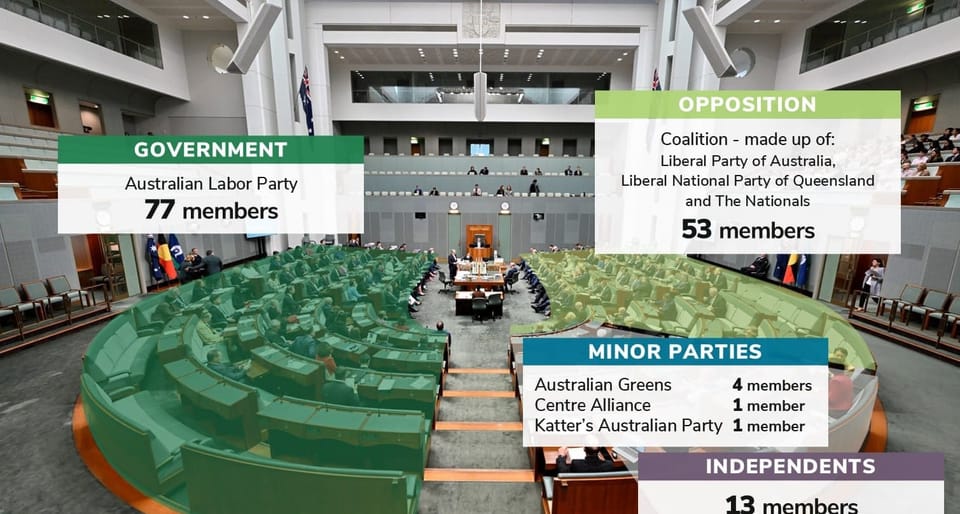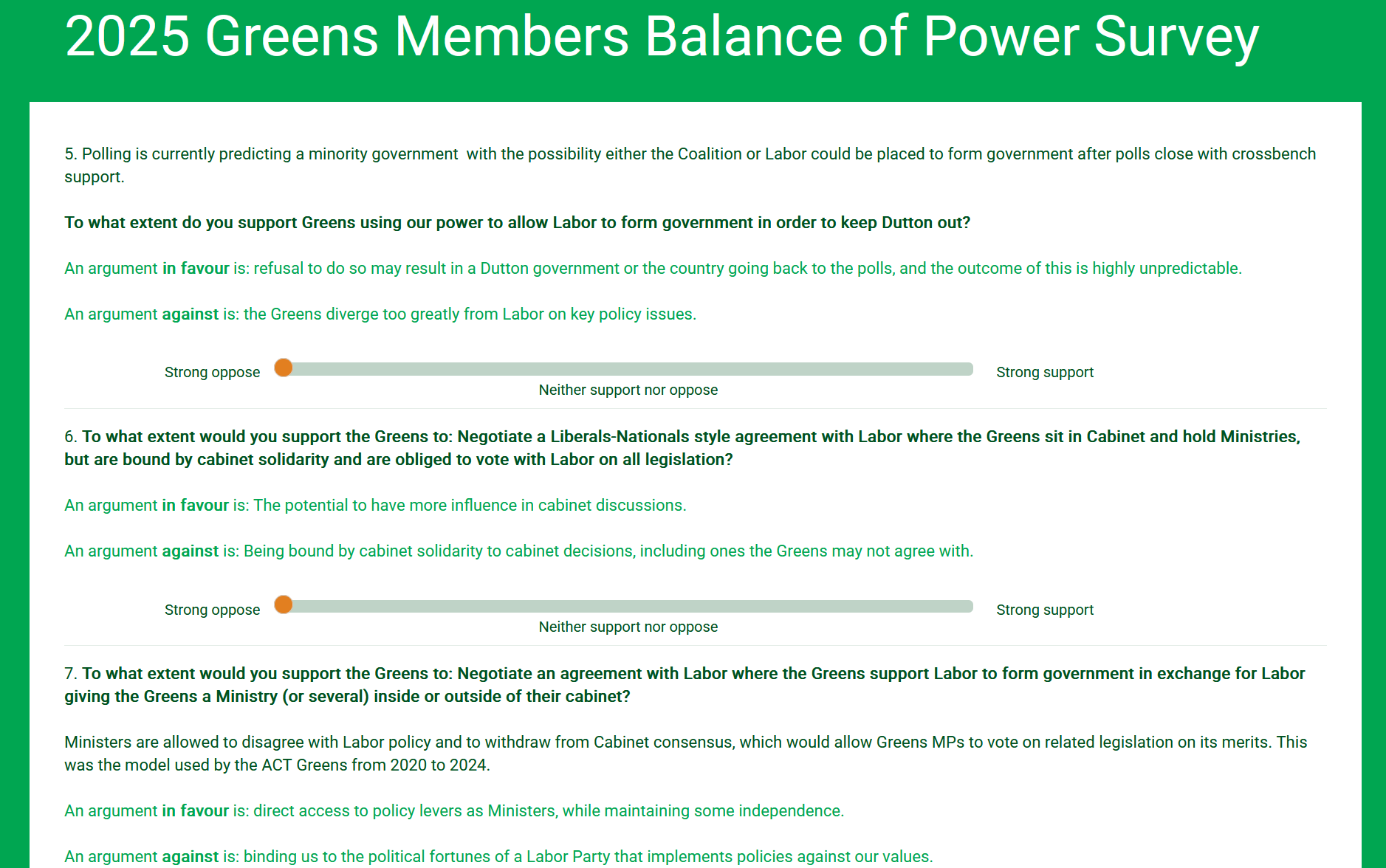Can activists ensure the Greens won't sell out in balance of power negotiations?

Australia could be approaching a critical political moment that those of us with an interest in deeper systemic change would be wise to start talking about now.
There are no guarantees, but it’s looking increasingly likely that neither major political party will hold enough seats after the coming federal election to form government without support from independent and minor party MPs.
Even if Labor retains enough seats in the House of Representatives (the 'lower house'), they will need Greens support in the Senate (the 'upper house') to pass any bills that don’t have Liberal National Party support.
Greens and independent MPs will likely have more negotiating leverage than ever before in Australian political history, and certainly more influence than at any point in the past 15 years.
Simply put, the basic choice for the Greens in a balance of power scenario will be:
a) Support Labor to form government in exchange for a list of policy concessions
or
b) Risk triggering another House of Representatives election in five or six months because no group of MPs can cobble together a big enough coalition to form stable government
Beyond that, the Greens will likely choose to retain autonomy over whether to support individual Labor bills over the coming parliamentary term, saying “If you want us to pass that, you need to make these changes.”
But initially, the most important decision will be about whether to support Labor to form government, and what negotiating red lines to insist on.
Independent MPs will be facing similar choices. How responsive they are to community pressure will likely vary from one electorate to the next.
How likely is it that the Greens will hold balance of power?
If Labor only loses a couple of seats in the May election, they'll be able to form government by doing deals with a few of the more progressive independent MPs, and won't require Greens support except in the Senate (this would still give the Greens some leverage, but not as much).
For the Greens to become politically relevant in BOP negotiations, Labor would have to lose at least 8 seats to the coalition. This seems possible based on recent polling, but certainly not guaranteed. If the Greens pick up an additional seat or two from Labor, the chances are of course even better. But even in that scenario, power would probably be shared with other independents, some of whom might be hostile to certain Greens demands.
To be honest, right now I wouldn't bet money on the Greens holding balance of power in the House of Representatives after 3 May, but if that does turn out to be the case, the party will have to decide very quickly what conditions it will insist on in exchange for guaranteeing Labor confidence and supply.
What's the Greens' decision-making process?
I’ve argued previously that Greens MPs must at least be willing to block Labor’s agenda to have any hope of negotiating significant positive legislative outcomes. I’ve also suggested that it’s best if the Greens use some form of public vote (or at least a vote of all Greens members) to help make these tough decisions, rather than Greens politicians making the call by themselves.
But the way things are currently structured, that decision on what policy concessions would be sufficient to support a Labor government will ultimately be made by federal Greens politicians behind closed doors, taking direct advice from their most senior staffers and maybe private group chats with their closest friends.
They will likely also look at the results of recent membership surveys, public opinion polls, and of course media commentary purporting to explain and analyse the election result. But the broader Greens membership, the thousands of campaign volunteers, and the nearly 2 million voters across the country who’ll be voting 1 for the Greens will not get a direct say.

The party's strongest formal pathway to influence the federal MPs will be via National Council (the peak Greens internal body, made up of volunteer delegates from each state), which appoints a consulting group made up of a few National Council members, who can advise the parliamentary negotiating team (which is led by parliamentary leader, Adam Bandt).
If ordinary Greens members like me want to give feedback to the Greens MPs about any proposed deals with Labor (beyond the limited feedback options in the recent members survey), we can email MPs directly like any other member of the public, and/or we can email our state's National Council delegate and hope that our views are relayed to the negotiating team via the consulting group.
This hierarchical approach to feedback and decision-making replicates the usual limitations of representative democracy. Rather than Greens members and supporters being encouraged to talk to each other and decide collectively what the best approach is, we're reduced to each passing on our individual views to our Greens MPs, without necessarily knowing what our fellow members think, or being prompted to consider the needs of the most oppressed members of society. So within quite a short timeframe, the MPs and National Council delegates will potentially be receiving a lot of contradictory feedback from different members, and having to decide which views to listen to and which perspectives to ignore.
Some Greens working groups will likely have their own conversations about what the party should do, and share their group's collective position with the federal Greens MPs, but the majority of members won't be involved in such spaces. Whatever agreement the Greens do or don't end up making with Labor in a balance of power context, the default party structures make it almost inevitable that a fair chunk of the membership will feel the federal Greens MPs haven't given their views enough weight.
The blunt reality is that the desires of ordinary Greens members might not be the topmost consideration for Adam Bandt and the rest of the party room.
The calculus for Greens and Independent MPs
In making the tough choice on whether to support a Labor government, Greens and Independent politicians will be weighing several competing considerations. The Labor leadership will be mindful of similar factors in deciding which policy demands they’re willing to agree to, or whether they’d rather refuse to compromise and risk another House of Reps election in a few months’ time.
These questions include:
- if the parties can’t reach agreement, who will voters blame for this, and how would a Greens decision not to support a Labor minority government be explained to the public?
- how big will the public backlash be if everyone is forced to vote a second time? And what are the chances of the Liberal-National coalition winning enough seats in the re-election that we end up with a hard-right fascist government?
- are other independent MPs backing the same policy demands as the Greens, or pushing in different directions?
- if Greens reluctance to guarantee supply (i.e. pass the budget) forces the PM to resign, how much campaigning capacity does their party still have to compete effectively in a re-run of the election at short notice, when most of their candidates and key campaign organisers are tired and desperate for a break? (and how does this compare to the other parties?)
- what issues do politicians think the election revolved around, and thus, what policies do they have a mandate to push for most strongly?
- how much did they win by in their most marginal seats?
- what particular issues do swing voters in marginal seats feel especially strongly about?
- how much will it hurt the Greens brand and the reputation of independent MPs in the long-term if they're seen to be supporting Labor more closely?
- and crucially: what’s the scale and tone of pushback going to be from the Greens MPs’ own core support base if they roll over and agree to support a Labor government without extracting enough meaningful policy concessions?
One strategic error the Greens may have made is that Adam Bandt’s pre-election messaging is strongly signalling that his party is willing to compromise with and support a Labor minority government. After the election, Bandt will be quietly worried that Labor voters who switch to voting 1 Greens on this basis would punish his party if failure to reach agreement forced another election. But it’s important not to overstate that concern.
Capacity-wise, a Lower House election re-run would suit the Greens more than Labor
If Labor and the Greens can’t reach agreement because Labor refuses to meet key Greens requests, and this eventually leads to a new election solely for the House of Representatives, the Greens will have a rare advantage.
Usually in federal elections, the Greens have to expend a lot of volunteer energy and money running field campaigns in dozens of lower house seats that they have no hope of winning in order to maintain a high enough Senate vote. But in a re-run election, the Greens will be able to concentrate far more resources on challenging the majors in one or two other marginal electorates that they hope to win, and defending their existing handful of seats (currently the Greens only hold 4 House of Reps seats, though they’re hoping to pick up a couple more). Meanwhile, Labor would be forced to spread its resources much more widely to defend 60+ House of Reps seats across the country, knowing that several dozen seats are potentially vulnerable to Liberal, Greens or independent challengers.
All else aside, that electoral terrain is far better for the Greens than Labor. All the parties will likely be facing some capacity challenges, potentially struggling to raise more money and mobilise volunteers so soon after the last election. But for the Greens, not having to worry about defending Senate seats would allow greater concentration of both volunteer energy and the campaigning capacity of their Senators, making it much easier to sandbag existing House of Reps seats while mounting serious challenges in a few more Labor-held electorates.
Even if millions of voters across the country are temporarily angry at the Greens for not reaching a compromise with Labor, it won’t really matter much as long as the Greens can hold their existing House of Reps seats, and grow their vote in a couple more winnable marginals.

Will the Greens push hard enough?
In the past term of federal government, the Greens rolled over repeatedly in negotiations with Labor on key bills, failing to extract significant, transformational concessions. They’ll have a lot more leverage after May if they hold balance of power in the House of Representatives, but they’ll also be under more pressure than ever to support ‘stable government,’ provide ‘certainty’ and ‘not let the perfect be the enemy of the good.’
Crucially, the interests of Greens MPs and senior staffers might diverge subtly from the interests of the broader Greens movement at this point. If you’re an MP or political staffer who has just been through a tough, tiring election campaign (and in the case of some states like Queensland, multiple recent state and local government elections as well), you’ll be feeling pretty exhausted, and more strongly inclined to avoid launching straight into another election.
On top of this, your job is on the line. Having gotten through the May election successfully, you’ll have a well-paid role that’s reasonably safe and stable for another 3 years. But if failure to achieve compromise with Labor triggers another House of Representatives election, you could suddenly lose it all. Some staffers will care about this more than others, but no MP wants to lose their seat after having just worked so hard to retain it.
Labor MPs will also be nervous about losing their jobs if the parties can’t agree, but Labor will still be reluctant to hand the Greens too many wins: “Greens have no power” is now Labor’s main argument for why voters should stick with Labor rather than swinging to the minor party. If the Greens secure lots of policy shifts through balance of power negotiations, they’ll look more powerful – Labor doesn’t want that.
Will the independents push hard enough?
Short answer: Definitely not. Most of the Climate 200 independent MPs are operating very much within a framework of centrist liberal reform. Not only are they subject to the same conservatising pressures and considerations as the Greens – most of them are already ideologically opposed to deeper system change and are inclined to prioritise 'government stability.'
They'll be talking to both Labor and the Liberals to see who they can get a better deal from, and won't be presenting a credible threat of triggering a new House of Reps election, which means they'll have much less negotiating leverage.

Supposedly ‘niche’ concerns of oppressed peoples could get overlooked entirely
In this kind of negotiating context, the Greens will likely feel they have the most leverage to insist on and push for policy reforms that are popular with and directly impact the lives of a broad base of voters.
For example, Labor probably won’t want a public narrative that “they spent millions of dollars re-running the election because they didn’t want to agree to the Greens’ demand for free dental care.” But they'll probably feel less concerned with a story that Labor and the Greens were close to reaching agreement, but the Greens insisted on trade embargoes with Israel, so now we have to go through another election.
There’s a very real risk that rectifying some of the most egregious human rights abuses in this country – such as our ongoing mistreatment of refugees – will be deprioritised in negotiations. Similarly, arguing for stronger land rights for Aboriginal people to veto projects on culturally significant sites might not be as high on the list as, for example, making public transport cheaper (still a good thing obviously) or other ‘universalist’ policies that the Greens focussed on during the election campaign.
This is where we all come in.
Activists as counter-weights
Across a range of struggles and issues, the Greens have often been on the right side of history, and so have consequently earned credibility with people engaged in progressive social movements. Many of us who are involved in different forms of grassroots organising and activism are inclined to give the Greens the benefit of the doubt. We trust that when tough decisions have to be made about whether to compromise or to stand firm, the party won’t sell us out. But in a situation where Labor needs Greens support to form government, and Greens MPs fear a re-run election that gives Peter Dutton a second shot at PM, the party will be under more pressure than ever before to settle for crumbs and incrementalist compromises.
So we need to start strategising now about how we keep Greens politicians and staffers accountable to the wider movement for social change if the party does end up in balance of power. What does that look like beyond writing emails that our Greens reps probably won’t even make time to read until after negotiations have concluded?
Is it simply a succession of rallies in city centres about different issues? Or more tightly facilitated public forums where we all collectively workshop what kinds of Labor-Greens compromise agreements we would and wouldn’t be happy with?
Will we have to organise protests and sit-ins at Greens offices calling on them not to support a Labor government? Or target re-elected Labor MPs to demand that they agree to what the Greens are asking for?
The window will be small. There’ll be lots of pressure on the Greens to make a decision quickly, so activists might only have a week or so after the election to elevate our issues and ensure they’re central to balance of power negotiations.
If the Greens do share balance of power, there’s a high risk the party could abandon its core issues and goals in order to deliver a short list of incremental social democratic reforms that please a broader constituency of voters, all in the name of building power for the next election in three years’ time. That’s essentially the strategy that the Labor party has adopted over recent decades. Long-term, it's a dead end.
Of course, other election outcomes are possible, and perhaps even more likely. If the Liberals win a few seats off Labor, but the Greens don’t pick up more Labor seats, Labor will likely be able to form government with support of a few teal independents, only requiring Greens support in the Senate.
Even in that scenario, those of us who care about deeper systemic change need to be paying close attention to how Greens MPs make decisions and who they take advice from, both through the final weeks of the election, and immediately afterwards.
Opportunities like this don't come along often. And disinterested cynicism won’t accomplish anything.

I'm not aware of many other people around Australia who are thinking and writing publicly about how radical movements for change should engage strategically with the Greens (please email me if you have recommendations). If you value pieces like this, please consider supporting my writing (and on-the-ground organising) by signing up for a paid subscription.
And if you haven't checked it out already, give this article a read (or listen) next...


Member discussion